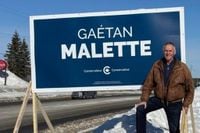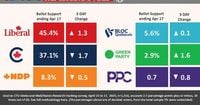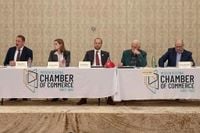As the federal election campaign heats up in Canada, candidates from various parties are making their voices heard, each vying for the support of constituents in their respective ridings. With the election date set for April 28, 2025, candidates have been actively engaging with voters and addressing pressing issues that resonate with the electorate.
Peter Bruce, the People’s Party of Canada (PPC) candidate for Regina–Wascana, launched his campaign on April 18, 2025, aiming to bring a new perspective to Parliament. Bruce, who has been a PPC member for six years, emphasizes the need to reduce government size and intrusion into citizens' lives. He stated, "We want to get the federal government out of the areas that our constitution says belong to the provinces," highlighting concerns over federal overreach into the oil and gas sector due to green policies. Housing affordability is another critical issue for Bruce, who believes a proposed moratorium on immigration could alleviate rising costs. He also pointed out that federal equalization payments need to be revised to ensure fairness for provinces like Saskatchewan.
Meanwhile, in Edmonton Strathcona, David Wojtowicz, also representing the PPC, shared his vision for change. As a business student at the Northern Alberta Institute of Technology, Wojtowicz is passionate about addressing educational issues, particularly advocating for free tuition. He expressed his belief that education should be an investment in the nation’s future, stating, "Realistically, that’s what should be expected of every nation because education is important." Wojtowicz also criticized the current education system, calling for improvements in quality and relevance. On the topic of affordability, he noted the federal government’s significant revenue, suggesting better allocation to enhance educational opportunities and support for students.
Polling data released by CTV News on April 18 indicates that the Liberal Party holds an eight-point lead over the Conservatives as the election campaign progresses. According to a three-day rolling sample by Nanos Research ending April 17, the Liberals garnered 45% support, while the Conservatives trailed at 37%. The New Democratic Party (NDP) received 8%, followed by the Bloc Quebecois at 6%, the Green Party at 3%, and the PPC at 1%. The data reveals that the Liberals maintain strong support in key regions, including Ontario, Atlantic Canada, and Quebec, while the Conservatives dominate in the Prairies.
In Mission-Matsqui-Abbotsford, Conservative candidate Brad Vis articulated his party's commitment to addressing rising living costs, crime, and housing challenges. Vis stated, "Under the last 10 years of the Liberal government, costs have skyrocketed, crime has skyrocketed, homelessness has increased, and job opportunities have declined." He emphasized the need for policies that lower housing costs and improve public safety, advocating for a proactive approach to community issues. Vis also highlighted the Conservative Party’s plan to utilize Canada’s natural resources to combat climate change, proposing the development of critical minerals for clean energy solutions.
On the other hand, NDP candidate Jules Côté underscored the importance of local investment and infrastructure. He argued that for every dollar invested in infrastructure, the economy grows by $1.50, contrasting this with the limited impact of corporate tax breaks. Côté called for a ban on corporate purchases of housing, emphasizing the need to protect working families from the growing influence of corporations in the real estate market.
In the North Island-Powell River riding, an all-candidates meeting took place on April 18, where candidates discussed their strategies to support small businesses amidst ongoing trade wars. Green Party candidate Jessica Wegg emphasized the importance of considering small businesses in every legislative decision, while Liberal candidate Jennifer Lash highlighted the need for streamlined funding and support for local entrepreneurs. NDP candidate Tanille Johnston called for collaboration between provincial and federal governments to provide immediate aid to small businesses affected by tariffs.
As the campaign unfolds, candidates like Gaétan Malette, Conservative candidate for Kapuskasing-Timmins-Mushkegowuk, are focusing on local issues such as crime and the cost of living. Malette, with 45 years of experience in forestry, agriculture, and mining, believes that removing the carbon tax and enhancing cooperation among municipal, provincial, and federal levels is essential to improving the region's economic prospects. He stated, "We have to stop fighting, we have to start working," emphasizing the need for a collaborative approach to governance.
The federal election is shaping up to be a pivotal moment for Canadian politics, with issues such as housing affordability, education, and economic stability taking center stage. As candidates continue to engage with their communities, the electorate is poised to make decisions that will impact the future direction of the country.









